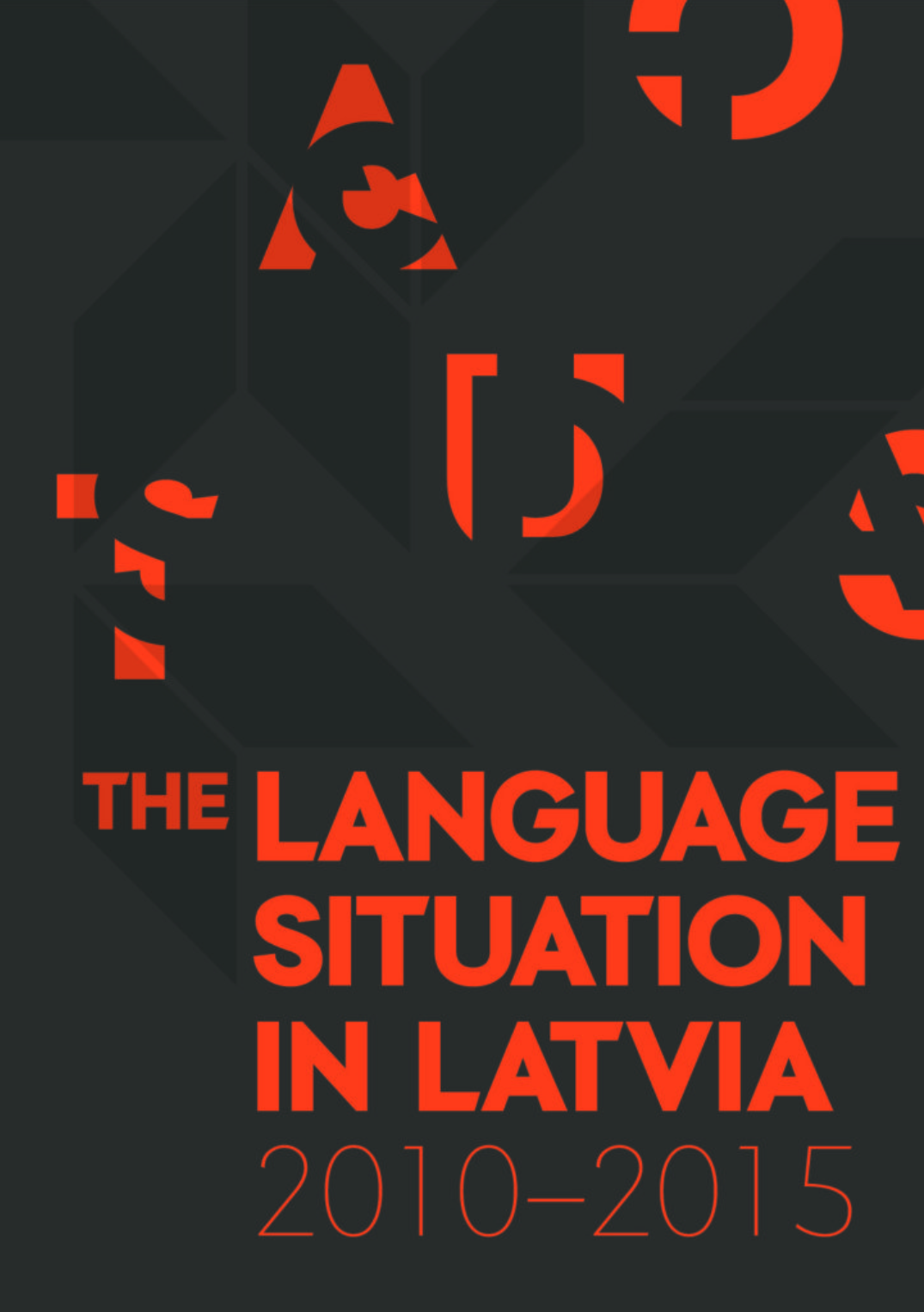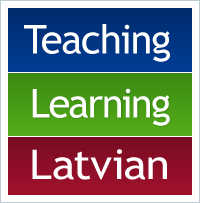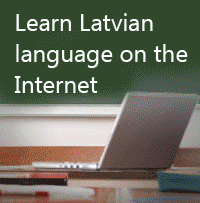The sociolinguistic study “Language situation in Latvia: 2016-2020″
The study “Language situation in Latvia: 2016-2020” is the next stage of the regular study of the language situation carried out by the Latvian Language Agency, and it analyses the dynamics of the language situation from 2016 to 2020.
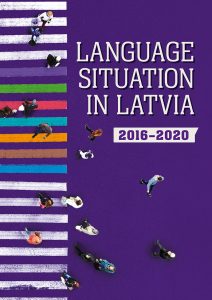
The study of the language situation reflects the situation of the Latvian language as the state language, as well as the language environment and conditions reached throughout the thirty years of independence of the Republic of Latvia. Moreover, it is possible to review and assess what exactly has changed, and how, during five years, as well as how dynamically or slowly the Latvian language situation and its main components and parameters, i.e. language skills and use, have changed since 1990.
The study analyses the Latvian language skill of Latvian residents and the problems related to its acquisition, language use in various sociolinguistic domains, and the proficiency and positions of various other languages in the linguistic environment; it pays more attention to language positions in the work environment, as well as the Latvian language in diaspora. The study is based on the results of both quantitative and qualitative surveys, it provides analysis in the context of both the results of previous studies and other data sources. The final chapter summarizes the main conclusions and recommendations for the implementation of language policy in the future.
This study will be useful to all organizations involved in implementing language policy, to linguists, to students of sociology and history, as well as to university lecturers and all interested in language policy.
The study is available here.
THE LANGUAGE SITUATION IN LATVIA: 2010-2015. A sociolinguistic study
Infographic Language situation in Latvia
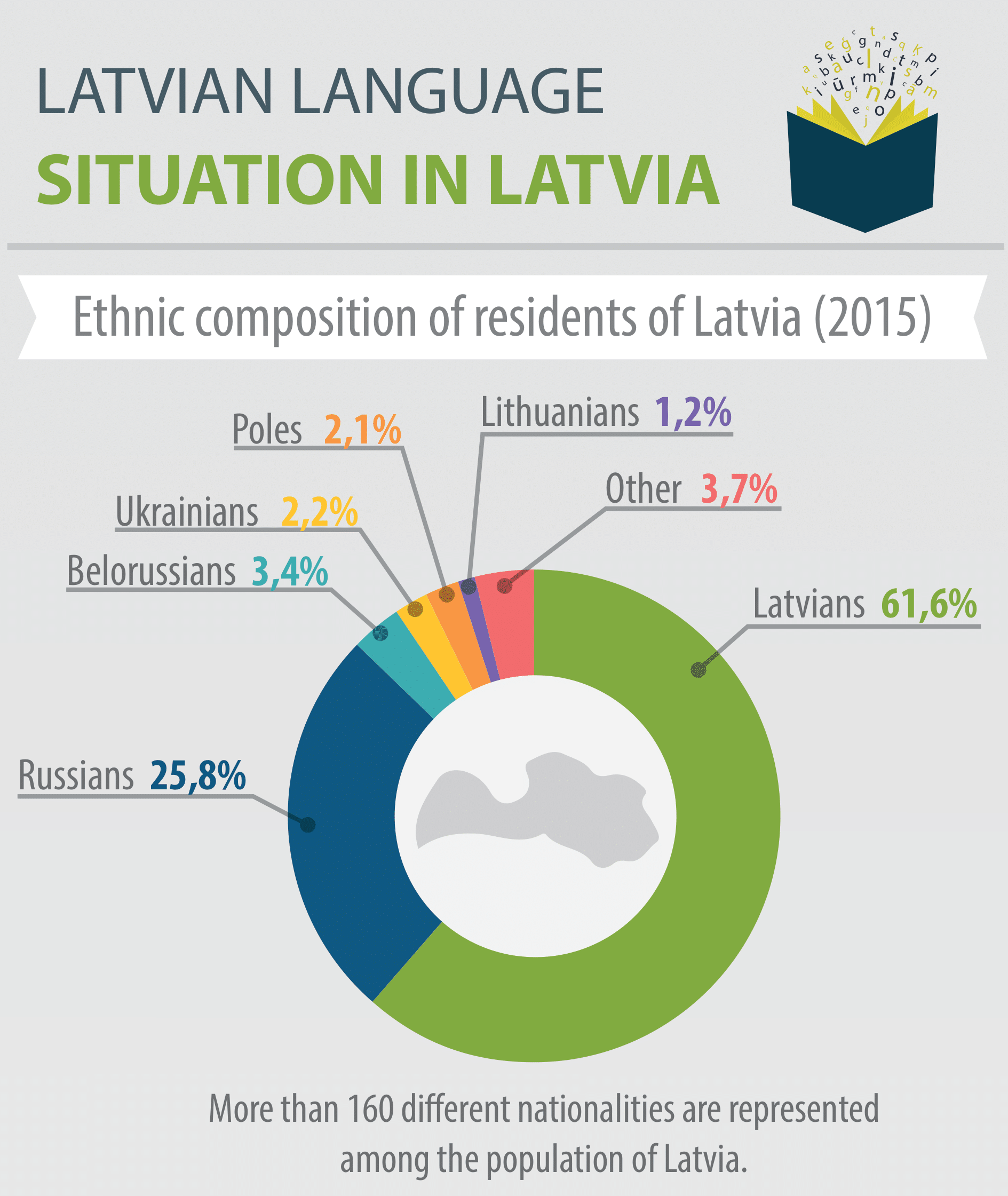
Translated by Laura Vabiščeviča.
Translation in English of „In Defence of the Latvian Language Against Russification. Documents from 1944-1989” is published
In 2012 the Latvian Language Agency published a book compiled by historian J. Riekstiņš in Latvian.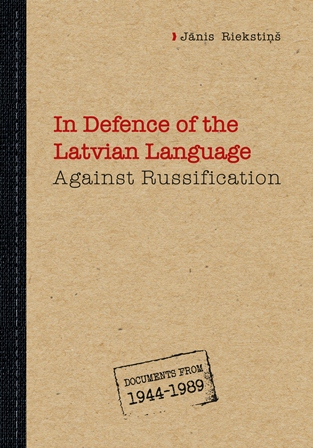
This edition has been translated into English (translators – Uldis Brūns un Jānis Kramēns). Documents utilized are from the Latvian Archive collection of the Latvian Communist Party Central Committee records, the Latvian Communist Party Central Control and Auditing Committee, the Latvian Soviet Socialist Republic Council of Ministers, the Latvian Soviet Socialist Republic Supreme Council, the Riga City Executive Committee, as well as documents from collections of other institutions, that verify the Soviet policies in Latvian SSR. Many of these documents are published for the first time (even in Latvian).
Similarly as in Latvian edition the book contains the introduction by Associate Professor in the School of Humanities and Communication Arts at the University of Western Sydney in Australia Dr. Uldis Ozoliņš. “The struggle for the status of the Latvian language during the Soviet occupation in 1944 to 1989”, as well as foreword by compiler and historian Jānis Riekstiņš.
The book can be bought at the Latvian Language Agency.
The summary of the study “The influence of migration on language environment in Latvia” is available electronically
The present study was preparing by compiling and extending the research 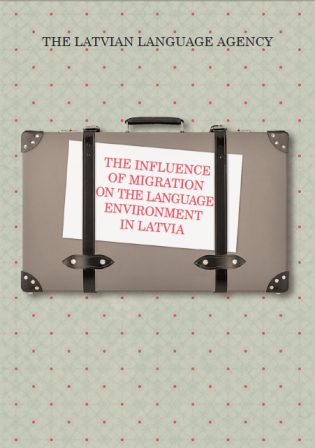 “Migrācijas ietekme uz valodas vidi Latvijā” (“The influence of migration on language environment in Latvia”. The Latvian Language Agency. Rīga : Zinātne, 2009. P. 143).
“Migrācijas ietekme uz valodas vidi Latvijā” (“The influence of migration on language environment in Latvia”. The Latvian Language Agency. Rīga : Zinātne, 2009. P. 143).
The work prepared by the authors is a scientific study that looks at the question of immigration mainly from the linguistic and integration perspective. The present study has been conducted to help to evaluate positive and negative factors of the integration process, the development and implementation of new, adequate socio-political and economic solutions (taking into account the latest trends in migration processes and the decrease of the number of the population in Latvia).
Due to migration the societies of many countries have become ethnically diverse and the transnational relation between state and society has strengthened. Thus, the migration issues have become an important and inevitable component of each country’s economic and social life and they are carefully addressed in the decision-making process.
The Latvian Language Agency with pleasure offers to find out useful information and conclusions for your scientific and human interests in this issue.
The summary of the study “Language situation in Latvia: 2004-2010” is available electronically
This summary outlines the major conclusions of the study “Language situation 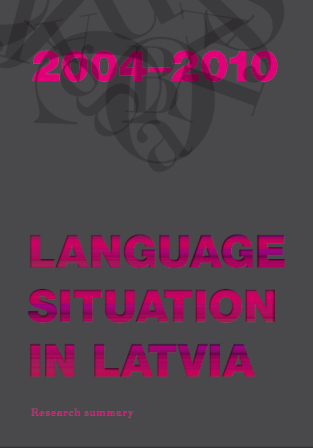 in Latvia: 2004-2010” (2011) and the results of the Latvian language policy implementation.
in Latvia: 2004-2010” (2011) and the results of the Latvian language policy implementation.
According to the structure of the study “Language situation in Latvia: 2004-2010” here are data and facts reflected about the language situation in the Latvia from 2004 to 2010, taking into account the historical development of the language situation.
The summary shows the progress made in the implementation of the language policy, as well as the main difficulties regarding the implementation of language policy and provision of competitiveness of the Latvian language as the official language. Brief information is provided on the following topics discussed in the research: language policy in Latvia and Latvian language in the EU, language skills, language usage and linguistic environment in Latvia, use the official language in major public sociolinguistic areas (central and local government administration, education, mass media and services), the Latvian language and globalisation.
The summary is available here.
The sociolinquistic study (full text) is available here.
Language: Report
(2007–2008)
The longitudinal research “Language” was carried out by BISS (Baltic Institute of Social Sciences). The annual surveys of the project “Language” were conducted from August till September, 2007 and from March till April, 2008. 2002 respondents participated during two phases of the survey in the whole area of Latvia. The method used was direct interviews at the places of residence of respondents. Multi level stratified random sample was applied to ensure representativeness of the Latvian residents of the age group 15–74.
The results of the researches were compared to the data of previous surveys that were conducted since June 1996 and had samples of about 2000 respondents. The report consists of the analytical part, graphs and tables.
Researches are available here – 2007 and 2008

